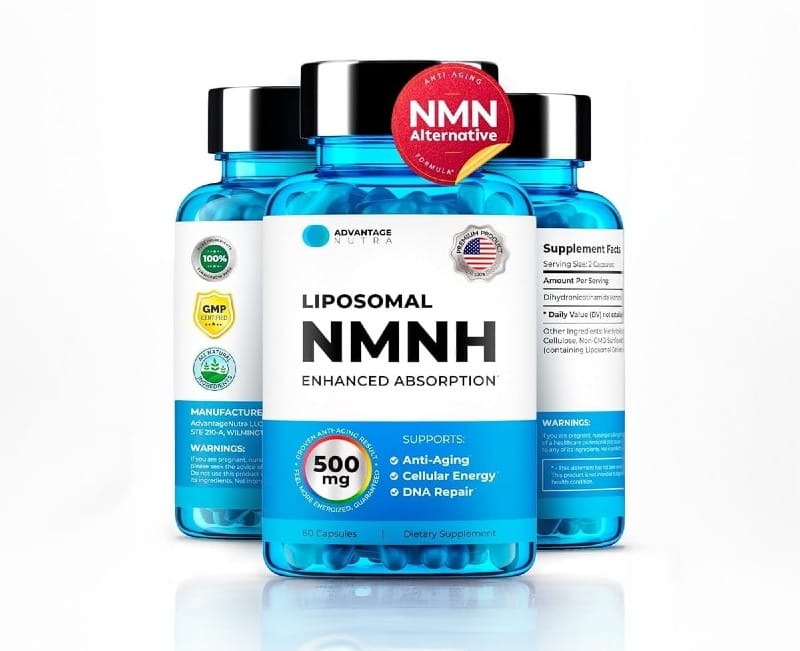In the world of longevity science, the search for effective NAD+ boosters continues to evolve. With the recent regulatory challenges facing NMN (Nicotinamide Mononucleotide), attention has turned to its reduced form, NMNH (Dihydronicotinamide Mononucleotide). This compound shows promise in enhancing NAD+ levels more effectively than its predecessors, but questions about its safety and legal status remain. Let's dive into the current research and regulatory landscape surrounding NMNH.
Key takeaways:
• NMNH is a potent NAD+ enhancer that may outperform NMN and NR
• Safety studies on orally administered NMNH are limited
• The legal status of NMNH as a dietary supplement is uncertain
• More research is needed to fully understand NMNH's potential and risks
The science behind NMNH
NMNH, or Dihydronicotinamide Mononucleotide, is a reduced form of NMN that functions as a precursor to NAD+ (Nicotinamide Adenine Dinucleotide). NAD+ is a crucial molecule involved in various cellular processes, and its levels tend to decline with age. This decline is associated with many age-related health issues, making NAD+ boosting compounds of great interest in longevity research[6].
A 2021 study published in Nature Metabolism demonstrated that NMNH is a potent NAD+ enhancer. The researchers found that NMNH not only increased NAD+ levels more effectively than NMN and Nicotinamide Riboside (NR) but also suppressed glycolysis, the TCA cycle, and cell growth[4]. This suggests that NMNH might have unique metabolic effects beyond simply boosting NAD+ levels.

Efficacy and potential benefits
While research on NMNH is still in its early stages, the compound shows promise in addressing age-related decline. Studies on NMN, which is closely related to NMNH, have demonstrated potential benefits in various areas:
- Metabolic health: NMN supplementation has been shown to improve insulin sensitivity and glucose tolerance in animal models[2].
- Cardiovascular function: Some studies suggest NMN may help protect against age-related decline in vascular function[2].
- Cognitive function: Preliminary research indicates that NMN might have neuroprotective effects and could potentially improve cognitive function[6].
Given the structural similarity between NMN and NMNH, it's possible that NMNH could offer similar or even enhanced benefits. However, it's crucial to note that most of these studies have been conducted in animal models, and more human trials are needed to confirm these effects.
Safety considerations and unknowns
One of the primary concerns surrounding NMNH is the limited data on its safety profile, particularly for oral supplementation. While some companies claim to have conducted toxicology studies, peer-reviewed safety data for NMNH is scarce in the scientific literature[3].
The safety profile of NMN, which is structurally similar to NMNH, has been more extensively studied. A recent review of NMN safety in humans found that doses up to 1200 mg per day were well-tolerated with no serious adverse effects reported[2]. However, it's important to note that NMNH and NMN are distinct compounds, and their safety profiles may differ.
Regulatory landscape and legal status
The regulatory status of NMNH as a dietary supplement is currently unclear. In the United States, new dietary ingredients (NDIs) must be notified to the FDA before being marketed. As of now, there's no public record of an NDI notification for NMNH[5].
The situation is further complicated by the FDA's recent stance on NMN. In 2022, the FDA ruled that NMN should be excluded from the dietary supplement category in the U.S.[8]. This decision was based on the fact that NMN was being investigated as a drug, which, under current regulations, precludes its use as a dietary supplement.
Given the similarity between NMN and NMNH, there's a possibility that NMNH could face similar regulatory challenges in the future. However, as of now, NMNH has not been explicitly banned or restricted by the FDA.
The future of NMNH research
Despite the current uncertainties, research into NMNH continues. Some companies are conducting preclinical and clinical trials to establish the safety and efficacy of NMNH as a NAD+ booster[7]. These studies aim to provide more comprehensive data on NMNH's effects in humans and its potential as a longevity-promoting compound.
As research progresses, we may gain a clearer understanding of NMNH's benefits, optimal dosing, and long-term safety profile. This information will be crucial for both regulatory bodies and consumers in determining the appropriate use of NMNH as a supplement.
Conclusion: Proceed with caution
While NMNH shows promise as a potent NAD+ booster, the current lack of comprehensive safety data and its uncertain regulatory status call for caution. As with any new supplement, it's crucial to approach NMNH with a healthy dose of skepticism and wait for more robust research before incorporating it into your longevity regimen.
For those interested in supporting NAD+ levels, consider these evidence-based alternatives:
• Focus on natural NAD+ precursors found in foods like milk, fish, and mushrooms
• Engage in regular exercise, which has been shown to naturally boost NAD+ levels
• Explore well-researched supplements like Nicotinamide Riboside (NR), which has a more established safety profile
Remember, the pursuit of longevity is a long-term endeavor. While cutting-edge compounds like NMNH may seem promising, a balanced approach focusing on proven lifestyle interventions remains the safest and most effective path to healthy aging.
Want to stay informed about the latest developments in longevity science? Sign up for our newsletter to receive curated content on anti-aging research, supplements, and lifestyle interventions.
References:
Citations:
[1] https://vara.life/blogs/longevity-news-2/is-nmn-the-anti-aging-molecule-banned-by-fda
[2] https://www.ncbi.nlm.nih.gov/pmc/articles/PMC10721522/
[4] https://pubmed.ncbi.nlm.nih.gov/33793246/
[5] https://downloads.regulations.gov/FDA-2022-S-0023-0029/content.pdf
[6] https://www.nature.com/articles/d42473-022-00002-7
[7] https://www.uthpeak.com/preclinical-and-clinical-study
[8] https://www.forbes.com/health/supplements/nicotinamide-mononucleotide/














Member discussion